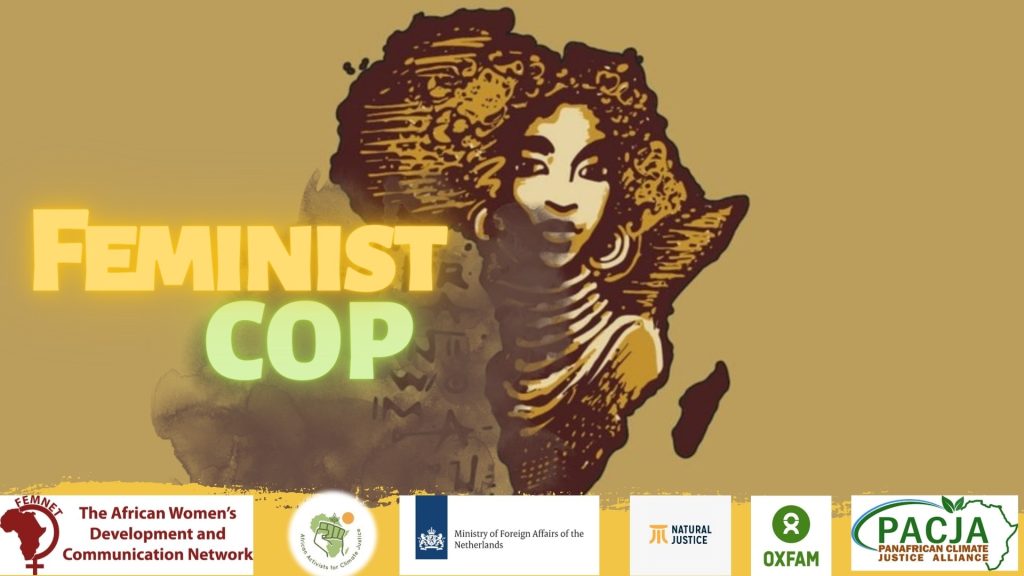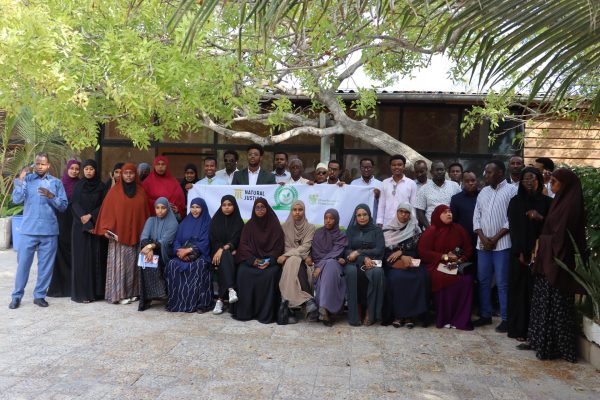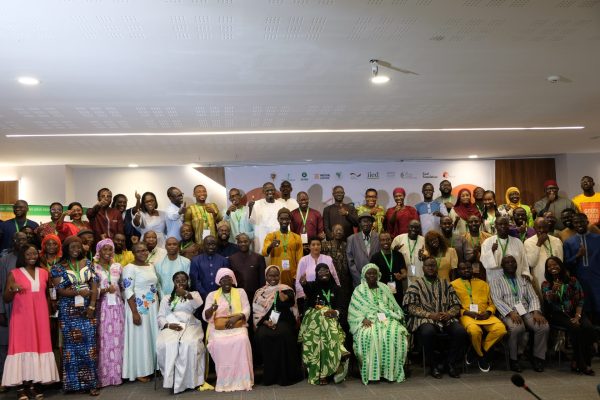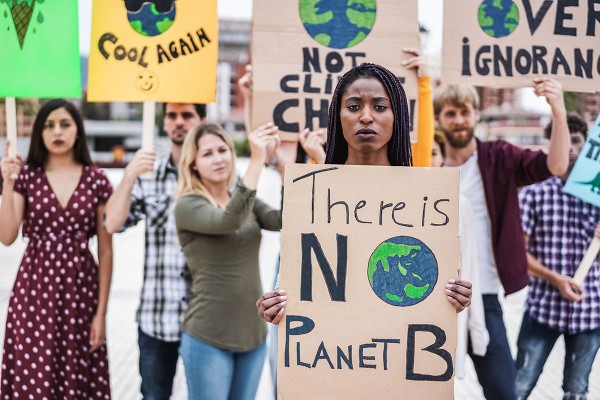In late October 2022, ahead of COP27, I attended and was inspired by the Feminist COP that was held in Namibia. Dubbed the “FemCOP”, this meeting centered feminist climate issues, in stark contrast to the actual COP27 one month later, which was slammed for rolling back progressive language on gender. There was also a disproportionately low participation of women in the UNFCCC processes and negotiations.
The purpose of FemCop[1] was to create an alternative space led by African feminists at the frontline of the climate crisis, to build solidarity and strengthen the feminist climate justice movement across the world in preparation for COP27.
It was very motivating to sit in a room full of women from Africa, discussing solutions while living on the front lines of the climate crisis and loss and damage. These women understand the lived reality of needing to support a family and community without the necessary resources; to provide food without land and access to water and to produce energy without access to electricity. There is much to learn from their innovation, but it is also important to tell their stories.
The Importance of Women’s Voices
Women are responsible for a disproportionate burden of unpaid labour, domestic work and childcare. According to Oxfam, about 80% of the world’s food is produced by small-scale farming. Women make up, on average, 43% of this agricultural labour in developing countries. It is, therefore, women who face multiple burdens when crops fail, including gender based violence when they are no longer able to feed their families. Women should be central to negotiating spaces aimed at advancing climate justice and a just energy transition.
Despite bearing the brunt of climate change impacts, the knowledge and importance of African women does not translate into their voices being heard when it comes to decisions regarding climate justice and the just energy transition. This is despite the fact that the voices of African women have been acknowledged by regional and international law.[2] This applies to their systematic marginalization from decision-making spaces, at the family-level, especially in patriarchal societies, but also within national and international structures. Let’s look at the example of COP27.
Lack of Women’s Participation in Cop27 Decisions
Recent analysis found women made up less than 34% of country negotiating teams in Egypt, while men made up 90% in some cases. Moreover, at the leaders’ summit, only seven women were present out of 110 leaders.
This means the solutions being offered at COP27 were devoid of any gender lens on how to address women disproportionately being impacted by climate change, and further lacked any gender analysis on gender and energy justice.
One critical example was the Gender Action Plan (GAP), which, it was hoped, would be progressive, with strong language, showing the urgency of the crisis, but instead was negotiated at the eleventh hour and not critically evaluated[3]. Some activist called the GAP, “mere lip service”[4] when it comes to real action.
This outcome came about even though there was a strong feminist group before and at COP27 who were at the forefront of making demands and building solidarity. They were up against strong opponents though – not just the leadership of countries, but also the strong push from fossil fuel companies to continue with business as normal (COP27 saw an increase of fossil fuel industry delegates). Within this difficult negotiating environment, real solutions could not be found. The voices of African women have, again been acknowledged but not seen in practice.[5]
Nothing About Us, Without Us!
Despite the odds against them, African women constantly leading the charge in the fight for change and transitions. As I have been researching the just energy transition which is planned for various countries, I am convinced that we should include their voices and knowledge. African women have not only been resisting patriarchy, but also colonialism, and now multinational corporations and fossil fuel companies threatening their land rights, livelihoods and in some cases their lives.
Fikile Ntshangase, an environmental activist from South Africa, was gunned down in her home in Somkhele in KwaZulu-Natal province, after raising concerns about a coal mine in the area. Since her murder in 2020, no arrests have been made. African women are now fighting against the push for gas in Africa, like Nonhle Mbuthuma of Amadiba Crisis Committee in South Africa fighting against the attempt for Shell to conduct seismic surveys.
During FEMCOP 2022, we acknowledged their struggles and paid homage to their bravery and the bravery of other women leading their struggles.
Ecofeminism and a Just Agricultural Transition
Many African women are also on the frontlines of the agricultural transition. Counter to patriarchal tropes, feminism has little to do with burning bras. It is a political ideology that challenges inequality, toxic power, and patriarchy that shapes economic, social and energy systems around the subjugation of women and the exploitation of their bodies, labour and land.
During FEMCOP, EcoFeminism was presented on by Dr Melania Chiponda, who has researched and written on this topic. EcoFeminism provides a solution to the current food and agricultural crises; recognizes the interconnection of women, land and the climate; challenges extractive and exploitative patriarchal systems; and thus makes space for women at the energy and climate decision-making table.
An agricultural transition needs to centre justice from an eco-feminist perspective, prioritising the small-scale woman farmer who cultivates and provides for her family and community. This sustainable way of life is being jeopardized by large-scale farming and big agribusiness which does not actually benefit communities, and its biproducts permanently damage land, disrupt ecosystems, pollute soil and water, and poison animals and people.
The Solution: A Feminist 2023 and COP28
Towards the end of the FemCOP, it became clearer to me that 2023 needs to bring with it a feminist COP28. This means a COP28 that values the voices of women and strengthens the language of equality, fairness and equity across the globe. Governments need to invest in and promote locally-led gender-just and feminist solutions and movements that are anti-capitalist and decolonial. This includes agricultural transitions through feminist ecology and ecofeminism.
There is no climate justice without gender justice! Viva the Feminist COP!
[1] The FemCOP was co-hosted by the African Women’s Development and Communication Network (FEMNET) together with its African Activists for Climate Justice (AACJ) consortium partners: Pan African Climate Justice Alliance (PACJA), Oxfam Novib, Natural Justice and the Africa Youth Commission. Read more about the FemCOP here.
[2] That acknowledgement has been recognized in the African Union Common Position which seeks to advance women’s full and effective participation and decision making in public life. It builds on Africa’s Agenda 2063; the Beijing Declaration and Platform for Action (BPfA); the Programme for Action of the International Conference on Population and Development (PAICPD); Agenda 2030 for Sustainable Development (SDGs) as well as the Convention on the Elimination of All Forms of Discrimination against Women (CEDAW); the AU Protocol on the Rights of Women in Africa (Maputo Protocol); the Solemn Declaration on Gender Equality in Africa (SDGEA); and the AU Strategy for Gender Equality and Women’s Empowerment. Additionally, the Human Right to a clean, healthy and sustainable environment recognizes the importance of gender equality, gender-responsive action to address climate change and environmental degradation. This right also acknowledges the empowerment, leadership, decision-making and full, equal and meaningful participation of women and girls, and the role that women play as managers, leaders and defenders of natural resources and agents of change in safeguarding the environment.
[3] Press Release: Collective Power Shines Amid a Process That Fails on Urgent Climate Action: Press Release: Collective Power Shines Amid a Process That Fails on Urgent Climate Action | Women & Gender Constituency (womengenderclimate.org)
[4] COP27 – Justice Delayed is Justice Denied: https://www.gendercc.net/genderunfccc/unfccc-conferences/sharm-el-sheikh-2022.htm
[5] That acknowledgement has been recognized in the African Union Common Position which seeks to advance women’s full and effective participation and decision making in public life. It builds on Africa’s Agenda 2063; the Beijing Declaration and Platform for Action (BPfA); the Programme for Action of the International Conference on Population and Development (PAICPD); Agenda 2030 for Sustainable Development (SDGs) as well as the Convention on the Elimination of All Forms of Discrimination against Women (CEDAW); the AU Protocol on the Rights of Women in Africa (Maputo Protocol); the Solemn Declaration on Gender Equality in Africa (SDGEA); and the AU Strategy for Gender Equality and Women’s Empowerment. Additionally, the Human Right to a clean, healthy and sustainable environment recognizes the importance of gender equality, gender-responsive action to address climate change and environmental degradation. This right also acknowledges the empowerment, leadership, decision-making and full, equal and meaningful participation of women and girls, and the role that women play as managers, leaders and defenders of natural resources and agents of change in safeguarding the environment.







